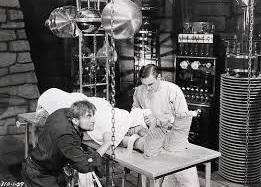 here's a lot of speculation out there about Anton Vaino, the guy that
Putin has chosen to replace his chief of staff, former KGB officer Sergei Ivanov.
Some of it is going off the deep end.
here's a lot of speculation out there about Anton Vaino, the guy that
Putin has chosen to replace his chief of staff, former KGB officer Sergei Ivanov.
Some of it is going off the deep end.
The BBC, for instance, says this about Vaino's 2012 article in the Russian language journal Economics and Law:
Written in a dense academic prose - which many Russian commentators this week said they found almost impossible to understand - and accompanied by even more complex charts and diagrams, the article outlines new ways of organising and understanding society.
The article describes a new device called a ‘nooscope’ which, it says, can tap into global consciousness and “detect and register changes in the biosphere and in human activity.”
The BBC goes on to quote some Russian economists who call it “a utopian idea which has no connection to science.” They quote one Russian professor as saying “It's a rejection of the current realities. They want to change things but they don't want to understand what things are really like.”
Mohit Priyadarshi at the Inquisitr writes:
Vaino appears to have constructed a mythology of his own through the clever use of intense academic jargon and quasi-mystical language, hoping to lead Russians to believe that he has gained access to a transcendental code which could bring an end to all human suffering. Claiming that he has a ‘code of the market’ at his disposal, Vaino's article argues that the ‘Nooscope’ can render the invisible visible, thus ushering in a new era of technologically adept humans that can co-exist peacefully with each other.

Frankenstein's lab and research associate
All this makes Vaino sound like a genius who has invented some clever device to control the world by sending out mind-control rays from his basement. But what does the article really say?
This Nooscope is not a machine and it doesn't use any new scientific principles. Essentially it's a scheme for using the Internet of Things (IoT) to get information about people's choices. Vaino bills it as “a paradigm of proactive management is to prevent crises due to the capitalization of the future.”
The first part of the article is a bunch of pseudo-scientific gibberish about human behavior being analogous to elementary particles that are subject to Heisenberg's Uncertainty Principle. He asks whether “the rationalized [world], so familiar to us that the world around us - familiar to us visually, aurally and touch - really exists, not only in our imagination.”
But his real goal is to understand market forces. The Western economist F.A. Hayek taught that market prices were information that functioned to establish value: since this mechanism does not exist in a socialist economy, wrote Hayek, socialist economies, in their attempts to allocate resources, must invariably gravitate toward authoritarianism. Vaino's promotion may be evidence that Russia is not planning to return to socialism.
Vaino's idea, which he says is protected by fifty patents, is for a central agency to collect vast amounts of data using radio, TV, and the Internet of Things. Each person will carry a little reader with wearable IDs that records whatever events the customer engages in (such as sports victories, life situations, and socio-economic reforms) and reports back the customers' reaction: “Event 1: I like this!' Event 2: I do not like! Event 3: I'll come back here!”
The benefits, he says, will accrue to economic planners, as in the so-called smart bus stop. There is nothing magical or mysterious about it. It is not much different from the commoditization of information currently being done by Facebook, Amazon, and Google. From the article:
NOOSKOP by reading the transaction market code captures the dynamics of the development of the market and its the slightest changes to allow for them, put on the balance sheet and the future capitalized.
Forget any paranoia you may be hearing about the Russians trying to control the world using a thought machine. This technocrat is basically proposing a way of tracking customers. He fluffs the idea up, as academics sometimes do, in quasi-scientific language.
The scheme would require lots of computer power and may there's not a chance in hell it will work, but it says something about the direction the Kremlin wants to go.

